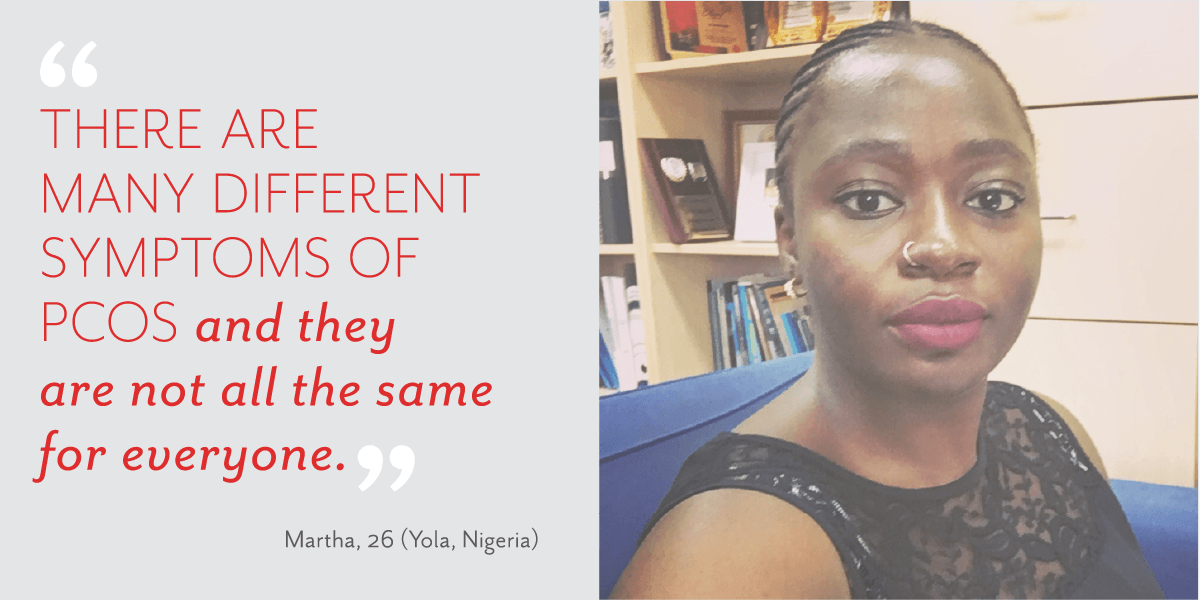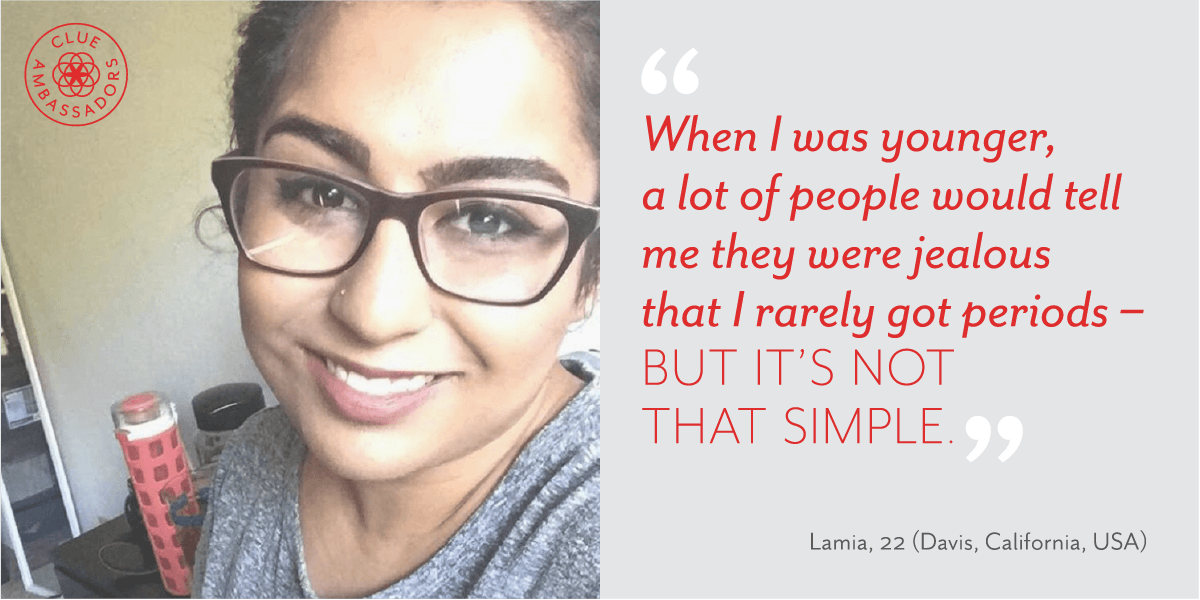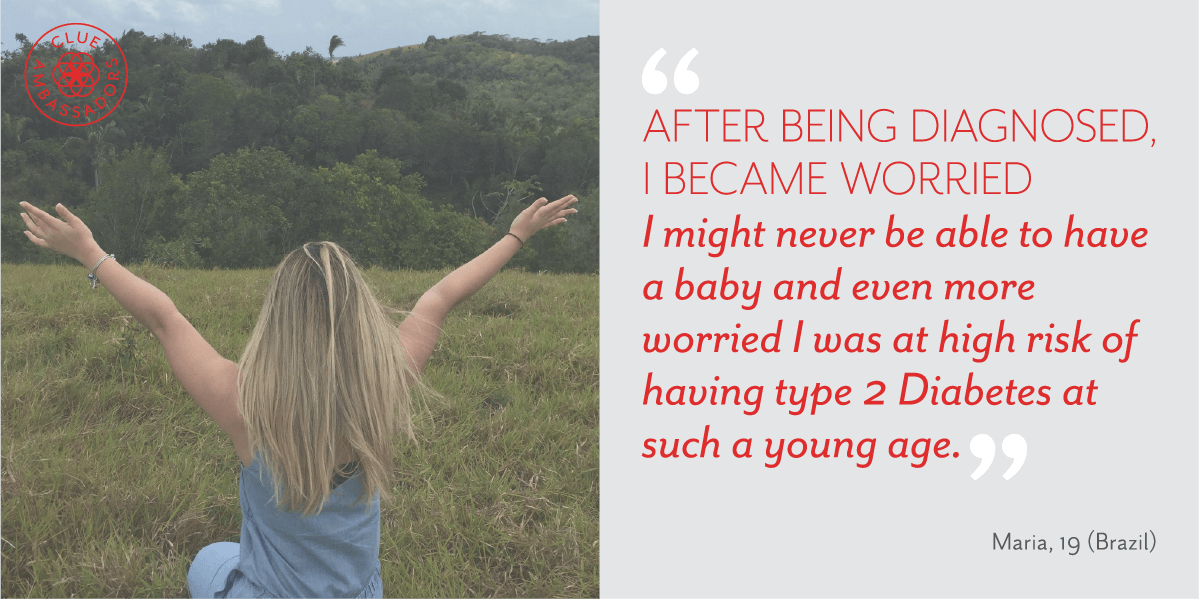Clue ambassador stories: PCOS
The Clue Ambassador Program is a community of people from all over the world using their voices to open the conversation around menstrual health.
We caught up with a few of our ambassadors about polycystic ovary syndrome or PCOS. Here's what they had to say:
Martha, 26

Where are you from? Yola, Nigeria
What's your profession? Economist
Why did you start using Clue? To track my period because it was irregular and that scared me.
What's your favorite thing to track in Clue? I can't decide between sex and exercise, so maybe both!
How does Polycystic Ovary Syndrome (PCOS) affect your daily life? I used to have irregular periods before my gynecologist prescribed birth control pills. I also struggle with my weight- I put it on easily but it's harder to get off even with daily exercise and monitoring what I eat. I am quite well-known for my mood swings among old high school and even college friends. It used to be worse, where I would disconnect and be withdrawn for days. I can manage it better now. It has also affected my sex life because there is a mental block that I can't get past when I am naked and in bed with someone. I get stuck on the fact that someone is looking AND touching my fat body!
How is menstrual health different for someone with PCOS? Before I got on the pill, it was exhausting not knowing when my next period was going to be. It made sex something I wanted to avoid altogether because I thought that I'd end up doing it at a wrong time and then get pregnant. For me, the worrying was perhaps the most difficult thing. When they first found cysts in my ovaries, I was really scared. I didn't understand what the implications were; I couldn't talk to my parents, and my sister who also has PCOS was not of much help either. It sucked to be so scared and not fully understanding what was happening to my body.
What should more people know about PCOS? I'll answer this question like I'm addressing my younger self upon finding out she has PCOS:
- This is not a disease that will kill you.
- Ask your gynecologist more questions! The more you know the better you'll feel and be.
- You will still be able to have babies, you might just need to try harder.
- There are many different symptoms of PCOS and they are not all the same for everyone.
Lamia, 22

Where are you from? Davis, California, USA
What's your profession? Development & Marketing Assistant
Why did you start using Clue? I started using Clue after I stopped taking the pill and began to let my period do what it wanted in terms of regularity/irregularity. I had to be able to track any trends so that I could bring it up to my doctor in case something was off, and because they tend to want to know when my last period was.
What's your favorite thing to track in Clue? I like tracking my cravings and energy levels. It's interesting to see how my periods affect my whole body.
How does polycystic ovary syndrome (PCOS) affect your daily life? PCOS has made life a lot harder for me. For one, after gaining 50 pounds in the matter of a year or two, I would carry that weight in my abdomen area because of PCOS - leading to a higher risk of heart disease. PCOS also causes me to have thicker facial hair, which is embarrassing and means I either wax every week or use a microblade to shave it off.
I struggle everyday with the idea that PCOS might cause me to not be able to have children, something I have wanted for a very long time. My chances of having a successful pregnancy decrease every year as long as I have PCOS.
It's also unnerving to never know whether I will miss my period and if it will be because of PCOS or because I am pregnant. Because of my amenorrhea (irregular periods), I wasn't used to having a period until I was 18. Until then, I would get blood everywhere because I wouldn't be able to keep up with my flow or I wouldn't have products on hand for when I randomly got my period.
How is menstrual health different for someone with PCOS? I think you have to pay attention a lot more to your menstrual cycles. It's also weird because when you actually get your period, it's a victory. When I was younger, a lot of people would tell me they were jealous that I rarely got periods, but it's not that simple - it means having to deal with the fact that my body is working against me at all times.
What should more people know about PCOS? I wish people knew ABOUT PCOS in general. It's tough having to explain it all the time to folks who don't understand why my period is so irregular. I also wish people would talk about it more, because I like discussing it. I wish there were more groups for people who have it.
How does PCOS affect your life as a trans/non-binary/queer person? It doesn't really affect me as a queer person. Although, I do identify as femme and it can be tough when your body wants you to be more masculine. I hate feeling like my femininity is challenged by PCOS.
Maria, 19

Where are you from? Brazil
What's your profession? Student
Why did you start using Clue? My doctor suggested I looked for an app to keep track of my cycle, in order to see how his line of treatment for my PCOS was working.
What's your favorite thing to track in Clue? Pretty much everything, I like to know what my body is going through and how each part of it—hair, skin, intestines—responds.
How does polycystic ovary syndrome (PCOS) affect your daily life? As someone so anxious, I got pretty worried when I experienced my first PCOS symptoms. I was on the pill for as long as I can remember, and one day I decided to quit. It took several months until I got my periods again. After being diagnosed, I became worried I might never be able to have a baby and even more worried I was in high risk of having type 2 Diabetes at such a young age. After I stopped taking the pill, my skin got terribly filled with acne and I had hair growing in a lot of unwanted places, making me pluck my eyebrows and shave much more often. Also, in order to avoid diabetes, I had to abdicate things that have always been part of my diet, and avoid eating sugar, candy and white flour. Now, after discussing the treatment options with my physician, I made a hard choice - I've decided I don't want to be a slave to a medication that was only treating my symptoms, and that I wanted to try to get my ovaries back to work, so I could one day get pregnant. It's been a long journey, but I think I made the right call. Today, I am healthy and fertile, which I want to be, and treating the cause of my condition, avoiding comorbidities, and also treating the symptoms with way more natural and healthy options.
How is menstrual health different for someone with PCOS? I believe it is different because the syndrome affects the main organ of menstrual health, the ovaries. For me, it causes menstrual irregularity, making harder for me to be sure which days will I get my period. Also, it makes me afraid I might have more difficulties getting pregnant then most women, since I wish to have lots of kids. For some women, it means depending on a drug and being subjected to its adverse effects for a lifetime. It also makes us more at risk of developing other diseases, and can cause us to have hormonal-related pimples, facial hair and weight gain.
What should more people know about PCOS? Definitely people should try to get a diagnosis, because it is a common condition amongst women, and it can lead them to have other health issues related to insulin resistance. It will also lead them to a proper treatment for some symptoms that they couldn't find explanation before, like acne, weight gain and hirsutism. For those who already have been diagnosed, it's important that they know the many ways it can be treated and that they can choose which one they best adapt. Also important to fight the insulin resistance and avoid that it gets worse because type II diabetes is a very serious disease.